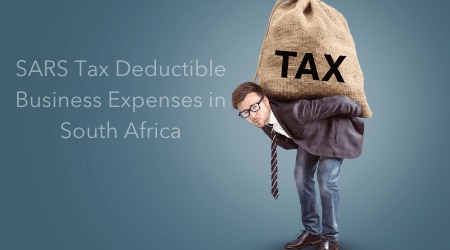Tax-deductible business expenses in South Africa
There are many types of tax-deductible business expenses and these apply to most types of businesses. Keep these deductions in mind when you prepare to file your own business tax.
1. Day-to-day business expenses
Day to day expenses include all financial outgoings that are incurred as part of running your business, such as:
- Material and equipment costs
- Employee costs and administration costs
- Business/office rental costs
- Office supplies
- Phone costs
- Travel and transport, including business vehicle costs
- Uniforms (if needed)
- Wholesale purchase costs for goods resold
- Financial charges (such as bank fees), utilities
- Legal fees
- Insurance fees
- Marketing, advertising and promotion costs
If you have a home office, you can also claim a percentage of your home expenses for work use, including:
- Rent or mortgage
- Insurance
- Rates and taxes
- Repair costs to the premises
- Utilities
- Cleaning
The percentage you can claim depends on how often you work from home and how much of the space is used for business purposes. It’s a good idea to check with a tax advisor on how much you can deduct.
2. Capital expenses
Capital expenses are purchases of major physical goods or services intended to be used long-term by your business, including:
- Equipment and machinery
- Business vehicles
- Renovation costs
- Hardware, such as computers
3. Education expenses
If you invest in education, whether for yourself or your staff, that directly relates to operating your business, you can deduct the cost as a business expense.
4. Entertainment expenses
All expenses incurred while entertaining clients, including drinks, meals, live entertainment, and venue hire, are tax deductible. However, in order to deduct these expenses, you must be able to prove to SARS that they were incurred in pursuit of business.
5. Business Start-up expenses
Any expenses relating to your business that were incurred before your first year of trade can be claimed as a tax-deductible expense. For example, if you purchased equipment for the purpose of running your business three months before starting to trade, you could claim it as SARS-deductible.
6. Net operating losses
Any losses you have incurred in the same business in previous years can be carried forward as a tax deduction.



